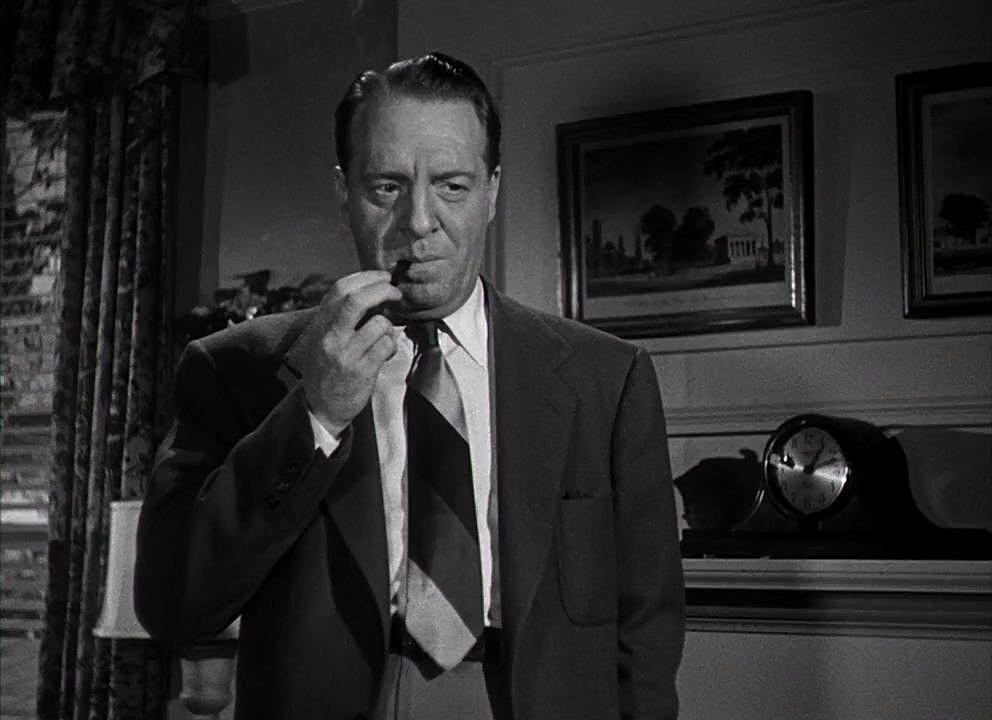NR | 1h 23m | Drama | 1956
“The Power and the Glory” is a compelling film written by screenwriter Rod Serling, delving into the realm of corporate ethics and governance. It presents a thought-provoking portrayal of the complexities and moral dilemmas faced within the corporate world.
The story revolves around Walter Ramsey (Everett Sloane), who inherited Ramsey & Company, a prominent Manhattan-based firm from his respected businessman father. Ramsey has meticulously built the company into an industrial empire through strategic stock transfers and takeovers, prioritizing growth over ethical practices. His ruthless demeanor has instilled fear rather than respect among those who work with him.
Ramsey’s hopes rest on Fred Staples (Van Heflin), a young executive he recently hired, whom he believes will accelerate the company’s acquisition-oriented growth and embody his own cutthroat style. However, an unexpected turn of events reveals that Staples is not aligned with Ramsey’s ways. On the contrary, Staples develops a deep admiration for William Briggs (Ed Begley), an honest and hardworking veteran of 40 years within the company. Briggs’ humane approach contradicts Ramsey’s ruthless methods, making him a target for dismissal. Despite this, Ramsey cannot bring himself to fire Briggs, hoping that Staples’ influence will lead to Briggs voluntarily resigning. However, the plan backfires, as Staples sees value in Briggs’ wisdom, trustworthiness, and compassion that has contributed to the company’s success.

Staples urges Briggs not to succumb to Ramsey’s antagonism and instead opts for resignation. But Briggs remains resilient, enduring Ramsey’s repeated humiliation. Briggs eventually collaborates with Staples on a crucial business plan, hoping to prove his worth. Nevertheless, Ramsey publicly praises Staples while degrading Briggs, causing him immense shame and anguish. The weight of the situation proves fatal for Briggs. Consumed by anger, Staples finds himself at odds with Ramsey’s relentless nature, forcing him to cautiously choose his next move.
Portraying a stark contrast in moral values, the tall figure of Heflin as Staples symbolizes virtue, while the diminutive Sloane represents the lack thereof. Begley delivers a brilliant performance as Briggs, refusing to compromise his old-world values of honor, character, and loyalty to his fellow dedicated employees.
Serling’s underlying message emphasizes the importance of having a humane core within corporations, particularly at the top echelons of power. He argues against a corporate culture that perceives employees as replaceable cogs in a wheel, devoid of personal lives, emotions, and vulnerabilities. Serling suggests that youth, embodied by Staples, is not necessarily superior to experience, as represented by Briggs. Furthermore, he reminds us that the younger generation is equally capable of wisdom, despite their lack of extensive experience. When in the right hands, big business can indeed be a positive force if guided by compassionate and astute leaders who prioritize the well-being of their employees and society.
Serling attributes the root of issues within capitalism not to the system itself, but rather to wavering ethical values. He argues that a truly free market requires responsibility and accountability. A genuine free market, according to Serling, promotes balanced growth and thoughtful consumption, while also embracing constructive criticism rather than suppressing it.

Director Fielder Cook introduces the film with a visually profound metaphor. The initial long shot portrays the imposing Ramsey Building in the bustling cityscape, emphasizing the vastness of power and influence. Conversely, the subsequent indoor shot reveals the intricate patterns of the building’s lavish interior, where individual faces, emotions, and engagements become discernible. Cook implies that great leaders possess the ability to combine a broad strategic vision with a deep understanding of the individual.

Begley and Staples do not denounce Ramsey’s emphasis on competitiveness, excellence, high standards, and meritocracy entirely. Instead, they advocate for the integration of these values with others such as teamwork, generosity, and employee happiness. They believe that a successful business should not resemble a soulless institution, but rather a place that acknowledges the humanity of both customers and staff. As Staples’ secretary (formerly Briggs) remarks, his effectiveness as an executive stems from his ability to admit mistakes and prioritize the well-being of himself and his team, even making time for leisure during lunch breaks. Humane governance should not be an afterthought but rather the essence of any institution’s existence.
Through skillful use of sound, Cook accentuates the importance of traditional values. As the shot focuses on the Ramsey Building, the audience is enveloped by the bustling sounds of people, traffic, and city life. In the midst of this cacophony, a solitary chime of a tower-clock can be heard, reminiscent of a dignified church bell. Cook emphasizes that amidst the chaos and pursuit of growth, humanity and values should remain steadfast and unyielding.
Discover more from Tension News
Subscribe to get the latest posts sent to your email.

